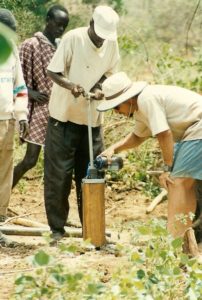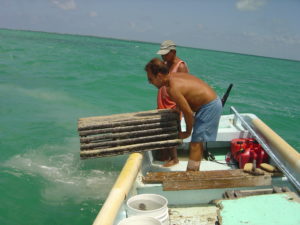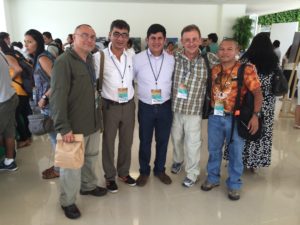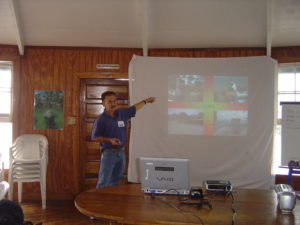Robby and the project
Robby Thigpen’s interest in marine conservation began in the early 1980s when working in South Carolina as a commercial fisherman.  His career brought him ashore and around the world through the 1990s, and in the mid-2000s he returned to the sea when he began formally studying marine biology, ecology, and anthropology at Appalachian State University. It was during this time that I first met Robby. He contacted me as he was preparing to endeavor on his first of many projects focused on fisheries in the Caribbean. Numerous phone calls and correspondence helped to frame-up one of the early projects, an internship studying the lobster fishery of Belize. I did not know at the time that a foundation was being laid for a long-term relationship focused on marine conservation shaped by locally appropriate content and locally relevant voices.
His career brought him ashore and around the world through the 1990s, and in the mid-2000s he returned to the sea when he began formally studying marine biology, ecology, and anthropology at Appalachian State University. It was during this time that I first met Robby. He contacted me as he was preparing to endeavor on his first of many projects focused on fisheries in the Caribbean. Numerous phone calls and correspondence helped to frame-up one of the early projects, an internship studying the lobster fishery of Belize. I did not know at the time that a foundation was being laid for a long-term relationship focused on marine conservation shaped by locally appropriate content and locally relevant voices.
From these early conversations with me and a few other marine scientists, Robby has built an extensive network of Indigenous peoples and professionals with experience and interest in marine ecosystems and fisheries in the Caribbean and beyond. About five years into this journey, he proposed the idea that was the genesis of a series of educational resources to promote marine conservation in communities and classrooms around the world, Treasures of the Caribbean.
To help find the voice for this story, Robby tapped into his growing network from around the world. The result was a deep and broad array of volunteers and collaborators, including Indigenous peoples and organizations, anthropologists, artists, biologists, educators, fishers, fishing cooperatives, fishery professionals, geologists, linguists, marine scientists, photographers, and resource managers. It became clear that the Treasures project would require a higher level of organization and funding. Robby’s interdisciplinary collection of professionals and practitioners led to the founding of Marine Conservation without Borders.
At MCwB, we share a passion for understanding and protecting fisheries species and the ecosystems in which they live and migrate. Equally, we are concerned with supporting the livelihoods and lifeways of the people who depend on these marine resources and environments. We aim to demonstrate this by tempering the knowledge and practice of marine science with an equally strong commitment to make clear the goals of why one would endeavor on this path to promoting sustainability. The third founding support of our approach is in weaving the messages into terms meaningful for people. All these great ideas of sustainability fall on deaf ears if they are not informed by local languages using culturally appropriate terms.
Why do we need to understand and change fishing and other behaviors in the marine ecosystem? To ensure resources are made available for future generations to earn their livelihoods from them. This is accomplished by conceiving of and prioritizing goals for sustainability of marine ecosystems with Indigenous fishing communities and people’s livelihoods as a singular objective. How communities derive their livelihoods may change, but supporting communities to build sustainable economic, social, and environmental platforms on which to base their livelihoods is fundamental. We build toward this goal by delivering biocultural conservation education resources in packages accessible to readers, young and old, in the indigenous communities on which we focus.
Apart from the ideas, conversations, and commitments that drive the work in fulfilling our mission, how has MCwB and our programming and projects come into being? You might say it began with financial support from a Gilman International Scholarship and institutional support from the Northern Fishermen’s Cooperative Society when Robby made his first trip to Belize to start learning about the Indigenous lobster fishery there. With this start, Robby fueled most of the progress with his passion and compassion toward his vision.
This type of sea-grassroots effort starting from the scratch and at the bottom is slow, and costly. Not costly in a financial monetary sense, as there was little money and no budget. It was the cost born of commitment and sacrifice to something larger than oneself. MCwB and our first set of the Treasures collection is the product of Robby’s generous giving of his time and his personal resources to create a more effective way  to promote conservation.
to promote conservation.
We have some momentum now, which feels great. We are expanding our conversation and people like you are reading our story. If you are able, please consider donating, a gesture of giving back to the sacrifices Robby has made in pulling together a diverse set of collaborators to make his vision a reality. If you are unable to donate financially, spread the word by sharing our story and helping us make more connections among the local and global communities who value locally relevant sustainability. Help support our vision of linguistically and culturally relevant biocultural conservation, a democratic sustainability that is by, of, and for the Indigenous communities that we serve.
Thomas D. King PhD. – Marine Conservation without Borders


